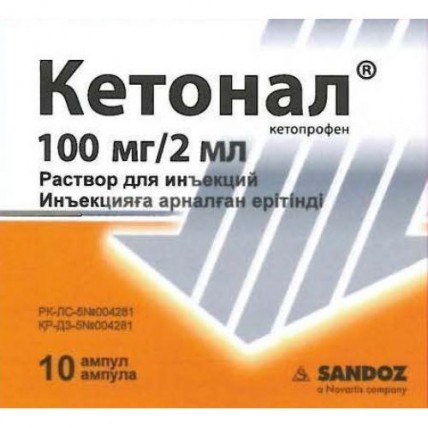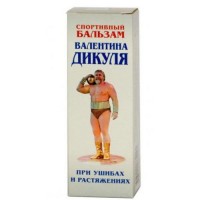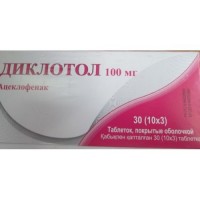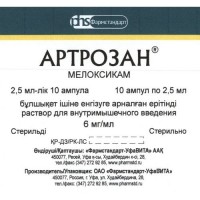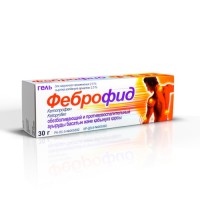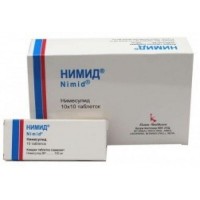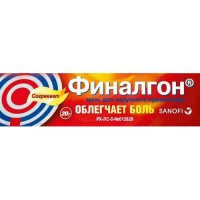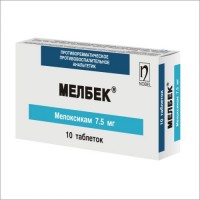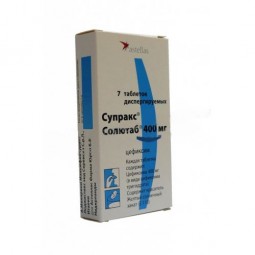Ketonal® (Ketoprofen) 100 mg / 2 ml 10s solution for injection in ampoules
- $33.30
The instruction for medical use
of Ketonal® medicine
the Trade name
of Ketonal®
the International unlicensed
name Ketoprofen Dosage Forms Solution for injections of 100 mg / 2 ml, 2 ml
Structure
of 2 ml of solution contain
active agent - ketoprofen of 100 mg,
excipients: propylene glycol, ethanol of 96%, benzyl alcohol (E 1519), sodium hydroxide, water for injections.
The description
Transparent solution from colourless till slightly yellowish color, practically without visible particles.
Pharmacotherapeutic group
Non-steroidal anti-inflammatory drugs. Propionic acid derivatives. Ketoprofen.
The ATX M01AE03 code
the Pharmacological
Pharmacokinetics Peak Plasma Concentration properties (26.4+5.4 mkg/ml) is reached in 4-5 minutes after intravenous infusion, through 15 minutes – after an intramuscular injection and remains within 2 hours.
The bioavailability is 90% and increases consistently with increase in a dose of drug. Ketoprofen for 99% contacts proteins of blood plasma, mainly albumin fraction. The volume of distribution is 0.1-0.2 l/kg.
In synovial fluid the concentration of ketoprofen reaches 50% of plasma concentration (1.5 mkg/ml), is brought out of synovial fluid slowly – within 24 hours.
Is exposed to metabolism in a liver where it conjugates with glucuronic acid. About 80% of ketoprofen are allocated with urine, mainly in the form of a conjugate with glucuronic acid. Less than 10% are removed in not changed view with a stake. Elimination half-life of ketoprofen reaches 2 hours. At patients with a renal failure ketoprofen is removed more slowly, and its elimination half-life lasts for 1 hour.
The pharmacodynamics
of Ketonal®, solution for injections, possesses the anti-inflammatory, anesthetizing and febrifugal action at the expense of inhibition of synthesis of prostaglandin in the central nervous system.
The mechanism of action is connected with inhibition of biosynthesis of prostaglandins and leukotrienes due to suppression of activity of enzyme of cyclooxygenase (cyclooxygenase-1 and cyclooxygenase-2) which catalyzes synthesis of prostaglandins from arachidonic acid. Ketoprofen stabilizes a liposomal membrane, renders the braking effect on synthesis of leukotriene and has antibradikininovy activity.
Indications
Pain syndrome:
- posttraumatic
- postoperative
- pain in metastases in a bone at patients with oncological diseases.
Rheumatic diseases:
- a pseudorheumatism
- seronegative spondylarthrites (an ankylosing spondylarthritis, psoriasis arthritis, reactive arthritis)
- gout, a pseudogout
- an osteoarthrosis
- extraarticular rheumatism (a tendinitis, a bursitis, a capsulitis of a shoulder joint).
A route of administration and doses
the Recommended dose – on 100 mg (1 ampoule) intramusculary 1-2 times a day.
If necessary treatment can be complemented with use of oral, rectal or external dosage forms of Ketonal.
Intravenous infusion is appointed only in the conditions of a hospital.
100-200 mg of ketoprofen get divorced in 100 ml of 0.9% of solution of sodium of chloride. It is entered within not less than 30-60 minutes.
The maximum daily dose (including all dosage forms) should not exceed 200 mg of ketoprofen.
Duration of treatment is defined by the doctor, it is not recommended to continue treatment by an injection form of a ketocash more than 3 days.
At patients with a renal failure with clearance of creatinine is lower 20ml/mines and with a chronic disease of a liver (with the reduced level of albumine in blood serum) it is necessary to reduce a ketoprofen dose.
At elderly patients the treatment should be begun with a low dose of ketoprofen and to carry out the supporting treatment by a drug minimal effective dose.
It is impossible to mix prevention tramadol and ketoprofen rolled into one as the deposit is formed. Bottles for infusion have to be wrapped in black paper or aluminum foil as ketoprofen is sensitive to light.
Side effects
At assessment of frequency of emergence of different side reactions were used such gradation: 'very often' – ³ 10%, are 'frequent' – from ³ 1% to & lt, 10%, 'infrequently' – from ³ 0.1% to & lt, 1%, is 'rare' – from ³ 0.01% to & lt, 0.1%, is 'very rare' – & lt, 0.01%.
Often:
- dispeptic phenomena, loss of appetite, nausea, vomiting, meteorism, abdominal pains, constipation
Infrequently:
- diarrhea, gastritis
- a headache, dizziness, drowsiness
- skin rash
- puffiness, pain and burning sensation in the place of an injection
It is rare:
- hemorrhagic anemia, a leukopenia
- a depression, insomnia, nervousness, paresthesia
- deterioration in sight
- sonitus
- stomatitis, ulcer of stomach and duodenum
- hepatitis, increase in level of transaminases and bilirubin
- increase in body weight
- an acute anaphylaxis
- a bronchospasm, an attack of bronchial asthma
Very seldom:
- exacerbation of colitis and Crohn's disease, gastrointestinal bleedings
- an abnormal liver function
- an acute renal failure, tubulointerstitsialny nephrite
- a hypernatremia, a hyperpotassemia
- an agranulocytosis, thrombocytopenia
- spasms
- heart failure
- arterial hypertension
- rhinitis
- a photosensitization, a Quincke's edema, bullous rash, including Stephens-Johnson's syndrome, a toxic epidermal necrolysis
of the Contraindication
- individual hypersensitivity to ketoprofen, aspirin or any of drug excipients.
Drug is also contraindicated in the following cases:
- existence in the anamnesis of bronchial asthma, urticaria, rhinitis, a bronchospasm or reactions of allergic type after use of ketoprofen or similar active ingredients, such as other nesteroydny anti-inflammatory drugs (NPVP) or salicylates (acetylsalicylic acid)
- heavy heart failure
- treatment of pain the perioperatsionny period when performing operation of aortocoronary shunting (AKS)
- a round ulcer in an active phase and also gastrointestinal bleeding, an ulcer or perforation in the anamnesis
- gastrointestinal, cerebrovascular or other active bleedings
- a chronic dipepsiya in the anamnesis
- the significant disturbances of functions of kidneys
- the significant disturbances of functions of a liver
- predisposition to bleeding
- disturbance of blood clotting or the current treatment by anticoagulants
- disturbances from blood (a leukopenia, thrombocytopenia, disturbances of hemocoagulation)
- pregnancy and the period of a lactation
- children's age up to 15 years.
Medicinal interactions
Attention! Not to mix Ketonal®, solution for injections and tramadol rolled into one in order to avoid precipitation.
The ketocash should not be applied in combination with other non-steroidal anti-inflammatory drugs and salicylates.
At the combined use with corticosteroids the risk of formation of ulcers and gastrointestinal bleeding increases.
Anticoagulants (heparin and warfarin) and inhibitors of aggregation of thrombocytes (i.e. tiklopidin, klopidogrel) increase risk of developing of bleeding. If joint reception is inevitable, careful observation of the patient is necessary.
The ketocash reduces efficiency hypotensive and diuretics. Risk of developing a renal failure is more at patients who accept diuretics, antihypertensives or APF inhibitors along with non-steroidal anti-inflammatory drugs.
Potassium drugs, kaliysberegayushchy diuretics, APF inhibitors, heparins (low molecular weight or undivided on fraction), cyclosporine, takrolimus and Trimethoprimum at simultaneous use with non-steroidal anti-inflammatory drugs can promote emergence of a hyperpotassemia.
The ketocash strengthens effect of oral glucose-lowering drugs and some anticonvulsants (Phenytoinum).
The ketocash, as well as other non-steroidal anti-inflammatory drugs reduces removal and by that increases toxicity of cardiac glycosides, lithium, cyclosporine and a methotrexate.
Non-steroidal anti-inflammatory drugs can reduce efficiency of mifepristone. Reception nonsteroid anti-inflammatory needs to be begun not earlier than in 8-12 days after mifepristone cancellation.
At simultaneous use of cyclosporine with a ketocash the risk of toxic damage of kidneys increases.
Special instructions
It is necessary to avoid simultaneous use of Ketonal of solution for injections with other non-steroidal anti-inflammatory drugs, including selection TsOG-2 inhibitors.
With extra care patients should appoint drug with digestive tract diseases in the anamnesis (bleeding and perforation can suddenly develop without the previous symptoms).
It is necessary to be careful also at the patients taking medicine which can increase risk of formation of ulcers or bleeding, such as corticosteroids of oral introduction, anticoagulants (for example warfarin), selective serotonin reuptake inhibitors or antiagregantny means (including acetylsalicylic acid). The risk of developing of gastrointestinal bleeding, formation or a perforation of ulcers increases with increase in doses of non-steroidal anti-inflammatory drugs. In such cases it is necessary to consider combination therapy with the drugs having protective effect on digestive tract (for example, mizoprostol or inhibitors of a protonew pomp).
Patients with digestive tract diseases (especially to elderly people) should report to the attending physician about any abdominal manifestations.
In case of developing of gastrointestinal bleeding or ulceration of digestive tract, it is necessary to stop treatment immediately.
Careful observation of patients with arterial hypertension and/or stagnant heart failure as there are messages about development or strengthening of a delay of liquid in an organism during therapy by ketoprofen is necessary.
During treatment, ketoprofen recommends monitoring of arterial blood pressure, especially at patients with cardiovascular diseases.
Patients with uncontrollable arterial hypertension, acute and heavy chronic heart failure, coronary heart disease, diseases peripheral arteries and/or cerebrovascular diseases should carry out treatment by ketoprofen with care. Use of some non-steroidal anti-inflammatory drugs can be connected with risk of developing arterial thromboses (myocardial infarction, a stroke). Data for an exception of such risk for ketoprofen are not enough.
At patients with asthma, with chronic rhinitis, chronic sinusitis and/or a nasal polipoz, emergence of allergic reactions is possible more often than at other patients.
It is also necessary to be careful at patients with disturbances of a hemostasis, hemophilia, an angiohemophilia - Jürgens, heavy thrombocytopenia, a renal or liver failure and at those patients who accept anticoagulants (coumarin and derivatives of heparin, first of all heparins of low molecular weight).
In an initiation of treatment it is necessary to carry out careful monitoring of renal function at patients with heart failure, cirrhosis and a nephrosis, at the patients accepting diuretics at patients with chronic kidney disease, especially if the patient at advanced age. Intake of ketoprofen can cause decrease in a renal blood-groove as a result of inhibition of prostaglandin in such patients and lead to a renal decompensation.
If during treatment visual disturbances are observed, treatment should be stopped.
Treatment by ketoprofen should be stopped before performing radical surgical interventions.
Ketoprofen can be applied in combination with morphine derivatives if pain is serious.
Intake of ketoprofen can worsen female fertility and is not recommended for women who want to become pregnant.
This medicine contains ethanol of 12.3% (in / c). Each dose of 2 ml contains 0.2 g of ethanol.
With care people of advanced age should appoint drug.
Long courses of therapy by non-steroidal anti-inflammatory drugs, including ketoprofen, demand monitoring of hematologic indicators, indicators of function of a liver and kidneys, in particular from elderly patients and if the clearance of creatinine at the patient below 0:33 ml / with (20 ml/min.), is required ketoprofen dose adjustment.
The feature of influence of medicine on ability to run the vehicle or potentially dangerous mechanisms
in case of developing of dizziness, a spatial disorientation, drowsiness, out-of-focus sight or spasms should not conduct transport or to operate potentially dangerous mechanisms.
Overdose
Symptoms: headache, dizziness, drowsiness, nausea, vomiting, diarrhea, abdominal pain. In case of heavy intoxication vomiting by blood, the black chair, consciousness disturbance, respiratory depression, hypotension, spasms, a renal failure and a renal failure can be observed.
Treatment: symptomatic, specific antidote does not exist. Impact of ketoprofen on digestive tract can be weakened by means of H2 blockers, inhibitors of a proton pomp and prostaglandins.
The form of release and packing
On 2 ml of solution in an ampoule of amber color with a red dot for a break is higher than a neck.
On 5 ampoules place in blister strip packaging from a film polyvinylchloride. On 2 planimetric packs together with the instruction for medical use in the state and Russian languages place in a pack from cardboard.
To Store storage conditions at a temperature not above 25 °C.
To store out of children's reach!
Period of storage
3 years.
Drug should not be used after the expiry date specified on packing.
Prescription status
According to the prescription
the Producer / Packer Lek Pharmasyyutikals of d, Slovenia
Address: Verovskova, 57, 1526 Ljubljana, Slovenia
Owner of the registration certificate
Lek Pharmasyyutikals of d, Slovenia
Address: Verovskova, 57, 1526 Ljubljana, Slovenia
the Address of the organization accepting in the territory of the Republic of Kazakhstan claims from consumers on quality of products (goods)
Representative office of JSC Sandoz Pharmasyyutikals d. d. in
Republic of Kazakhstan Almaty, Luganskogo St. 96,
the Phone number - 258 10 48, fax: +7 727 258 10 47
e-mail:
To Develop kzsdz.drugsafety@sandoz.com
of Ketonal® medicine
the Trade name
of Ketonal®
the International unlicensed
name Ketoprofen Dosage Forms Solution for injections of 100 mg / 2 ml, 2 ml
Structure
of 2 ml of solution contain
active agent - ketoprofen of 100 mg,
excipients: propylene glycol, ethanol of 96%, benzyl alcohol (E 1519), sodium hydroxide, water for injections.
The description
Transparent solution from colourless till slightly yellowish color, practically without visible particles.
Pharmacotherapeutic group
Non-steroidal anti-inflammatory drugs. Propionic acid derivatives. Ketoprofen.
The ATX M01AE03 code
the Pharmacological
Pharmacokinetics Peak Plasma Concentration properties (26.4+5.4 mkg/ml) is reached in 4-5 minutes after intravenous infusion, through 15 minutes – after an intramuscular injection and remains within 2 hours.
The bioavailability is 90% and increases consistently with increase in a dose of drug. Ketoprofen for 99% contacts proteins of blood plasma, mainly albumin fraction. The volume of distribution is 0.1-0.2 l/kg.
In synovial fluid the concentration of ketoprofen reaches 50% of plasma concentration (1.5 mkg/ml), is brought out of synovial fluid slowly – within 24 hours.
Is exposed to metabolism in a liver where it conjugates with glucuronic acid. About 80% of ketoprofen are allocated with urine, mainly in the form of a conjugate with glucuronic acid. Less than 10% are removed in not changed view with a stake. Elimination half-life of ketoprofen reaches 2 hours. At patients with a renal failure ketoprofen is removed more slowly, and its elimination half-life lasts for 1 hour.
The pharmacodynamics
of Ketonal®, solution for injections, possesses the anti-inflammatory, anesthetizing and febrifugal action at the expense of inhibition of synthesis of prostaglandin in the central nervous system.
The mechanism of action is connected with inhibition of biosynthesis of prostaglandins and leukotrienes due to suppression of activity of enzyme of cyclooxygenase (cyclooxygenase-1 and cyclooxygenase-2) which catalyzes synthesis of prostaglandins from arachidonic acid. Ketoprofen stabilizes a liposomal membrane, renders the braking effect on synthesis of leukotriene and has antibradikininovy activity.
Indications
Pain syndrome:
- posttraumatic
- postoperative
- pain in metastases in a bone at patients with oncological diseases.
Rheumatic diseases:
- a pseudorheumatism
- seronegative spondylarthrites (an ankylosing spondylarthritis, psoriasis arthritis, reactive arthritis)
- gout, a pseudogout
- an osteoarthrosis
- extraarticular rheumatism (a tendinitis, a bursitis, a capsulitis of a shoulder joint).
A route of administration and doses
the Recommended dose – on 100 mg (1 ampoule) intramusculary 1-2 times a day.
If necessary treatment can be complemented with use of oral, rectal or external dosage forms of Ketonal.
Intravenous infusion is appointed only in the conditions of a hospital.
100-200 mg of ketoprofen get divorced in 100 ml of 0.9% of solution of sodium of chloride. It is entered within not less than 30-60 minutes.
The maximum daily dose (including all dosage forms) should not exceed 200 mg of ketoprofen.
Duration of treatment is defined by the doctor, it is not recommended to continue treatment by an injection form of a ketocash more than 3 days.
At patients with a renal failure with clearance of creatinine is lower 20ml/mines and with a chronic disease of a liver (with the reduced level of albumine in blood serum) it is necessary to reduce a ketoprofen dose.
At elderly patients the treatment should be begun with a low dose of ketoprofen and to carry out the supporting treatment by a drug minimal effective dose.
It is impossible to mix prevention tramadol and ketoprofen rolled into one as the deposit is formed. Bottles for infusion have to be wrapped in black paper or aluminum foil as ketoprofen is sensitive to light.
Side effects
At assessment of frequency of emergence of different side reactions were used such gradation: 'very often' – ³ 10%, are 'frequent' – from ³ 1% to & lt, 10%, 'infrequently' – from ³ 0.1% to & lt, 1%, is 'rare' – from ³ 0.01% to & lt, 0.1%, is 'very rare' – & lt, 0.01%.
Often:
- dispeptic phenomena, loss of appetite, nausea, vomiting, meteorism, abdominal pains, constipation
Infrequently:
- diarrhea, gastritis
- a headache, dizziness, drowsiness
- skin rash
- puffiness, pain and burning sensation in the place of an injection
It is rare:
- hemorrhagic anemia, a leukopenia
- a depression, insomnia, nervousness, paresthesia
- deterioration in sight
- sonitus
- stomatitis, ulcer of stomach and duodenum
- hepatitis, increase in level of transaminases and bilirubin
- increase in body weight
- an acute anaphylaxis
- a bronchospasm, an attack of bronchial asthma
Very seldom:
- exacerbation of colitis and Crohn's disease, gastrointestinal bleedings
- an abnormal liver function
- an acute renal failure, tubulointerstitsialny nephrite
- a hypernatremia, a hyperpotassemia
- an agranulocytosis, thrombocytopenia
- spasms
- heart failure
- arterial hypertension
- rhinitis
- a photosensitization, a Quincke's edema, bullous rash, including Stephens-Johnson's syndrome, a toxic epidermal necrolysis
of the Contraindication
- individual hypersensitivity to ketoprofen, aspirin or any of drug excipients.
Drug is also contraindicated in the following cases:
- existence in the anamnesis of bronchial asthma, urticaria, rhinitis, a bronchospasm or reactions of allergic type after use of ketoprofen or similar active ingredients, such as other nesteroydny anti-inflammatory drugs (NPVP) or salicylates (acetylsalicylic acid)
- heavy heart failure
- treatment of pain the perioperatsionny period when performing operation of aortocoronary shunting (AKS)
- a round ulcer in an active phase and also gastrointestinal bleeding, an ulcer or perforation in the anamnesis
- gastrointestinal, cerebrovascular or other active bleedings
- a chronic dipepsiya in the anamnesis
- the significant disturbances of functions of kidneys
- the significant disturbances of functions of a liver
- predisposition to bleeding
- disturbance of blood clotting or the current treatment by anticoagulants
- disturbances from blood (a leukopenia, thrombocytopenia, disturbances of hemocoagulation)
- pregnancy and the period of a lactation
- children's age up to 15 years.
Medicinal interactions
Attention! Not to mix Ketonal®, solution for injections and tramadol rolled into one in order to avoid precipitation.
The ketocash should not be applied in combination with other non-steroidal anti-inflammatory drugs and salicylates.
At the combined use with corticosteroids the risk of formation of ulcers and gastrointestinal bleeding increases.
Anticoagulants (heparin and warfarin) and inhibitors of aggregation of thrombocytes (i.e. tiklopidin, klopidogrel) increase risk of developing of bleeding. If joint reception is inevitable, careful observation of the patient is necessary.
The ketocash reduces efficiency hypotensive and diuretics. Risk of developing a renal failure is more at patients who accept diuretics, antihypertensives or APF inhibitors along with non-steroidal anti-inflammatory drugs.
Potassium drugs, kaliysberegayushchy diuretics, APF inhibitors, heparins (low molecular weight or undivided on fraction), cyclosporine, takrolimus and Trimethoprimum at simultaneous use with non-steroidal anti-inflammatory drugs can promote emergence of a hyperpotassemia.
The ketocash strengthens effect of oral glucose-lowering drugs and some anticonvulsants (Phenytoinum).
The ketocash, as well as other non-steroidal anti-inflammatory drugs reduces removal and by that increases toxicity of cardiac glycosides, lithium, cyclosporine and a methotrexate.
Non-steroidal anti-inflammatory drugs can reduce efficiency of mifepristone. Reception nonsteroid anti-inflammatory needs to be begun not earlier than in 8-12 days after mifepristone cancellation.
At simultaneous use of cyclosporine with a ketocash the risk of toxic damage of kidneys increases.
Special instructions
It is necessary to avoid simultaneous use of Ketonal of solution for injections with other non-steroidal anti-inflammatory drugs, including selection TsOG-2 inhibitors.
With extra care patients should appoint drug with digestive tract diseases in the anamnesis (bleeding and perforation can suddenly develop without the previous symptoms).
It is necessary to be careful also at the patients taking medicine which can increase risk of formation of ulcers or bleeding, such as corticosteroids of oral introduction, anticoagulants (for example warfarin), selective serotonin reuptake inhibitors or antiagregantny means (including acetylsalicylic acid). The risk of developing of gastrointestinal bleeding, formation or a perforation of ulcers increases with increase in doses of non-steroidal anti-inflammatory drugs. In such cases it is necessary to consider combination therapy with the drugs having protective effect on digestive tract (for example, mizoprostol or inhibitors of a protonew pomp).
Patients with digestive tract diseases (especially to elderly people) should report to the attending physician about any abdominal manifestations.
In case of developing of gastrointestinal bleeding or ulceration of digestive tract, it is necessary to stop treatment immediately.
Careful observation of patients with arterial hypertension and/or stagnant heart failure as there are messages about development or strengthening of a delay of liquid in an organism during therapy by ketoprofen is necessary.
During treatment, ketoprofen recommends monitoring of arterial blood pressure, especially at patients with cardiovascular diseases.
Patients with uncontrollable arterial hypertension, acute and heavy chronic heart failure, coronary heart disease, diseases peripheral arteries and/or cerebrovascular diseases should carry out treatment by ketoprofen with care. Use of some non-steroidal anti-inflammatory drugs can be connected with risk of developing arterial thromboses (myocardial infarction, a stroke). Data for an exception of such risk for ketoprofen are not enough.
At patients with asthma, with chronic rhinitis, chronic sinusitis and/or a nasal polipoz, emergence of allergic reactions is possible more often than at other patients.
It is also necessary to be careful at patients with disturbances of a hemostasis, hemophilia, an angiohemophilia - Jürgens, heavy thrombocytopenia, a renal or liver failure and at those patients who accept anticoagulants (coumarin and derivatives of heparin, first of all heparins of low molecular weight).
In an initiation of treatment it is necessary to carry out careful monitoring of renal function at patients with heart failure, cirrhosis and a nephrosis, at the patients accepting diuretics at patients with chronic kidney disease, especially if the patient at advanced age. Intake of ketoprofen can cause decrease in a renal blood-groove as a result of inhibition of prostaglandin in such patients and lead to a renal decompensation.
If during treatment visual disturbances are observed, treatment should be stopped.
Treatment by ketoprofen should be stopped before performing radical surgical interventions.
Ketoprofen can be applied in combination with morphine derivatives if pain is serious.
Intake of ketoprofen can worsen female fertility and is not recommended for women who want to become pregnant.
This medicine contains ethanol of 12.3% (in / c). Each dose of 2 ml contains 0.2 g of ethanol.
With care people of advanced age should appoint drug.
Long courses of therapy by non-steroidal anti-inflammatory drugs, including ketoprofen, demand monitoring of hematologic indicators, indicators of function of a liver and kidneys, in particular from elderly patients and if the clearance of creatinine at the patient below 0:33 ml / with (20 ml/min.), is required ketoprofen dose adjustment.
The feature of influence of medicine on ability to run the vehicle or potentially dangerous mechanisms
in case of developing of dizziness, a spatial disorientation, drowsiness, out-of-focus sight or spasms should not conduct transport or to operate potentially dangerous mechanisms.
Overdose
Symptoms: headache, dizziness, drowsiness, nausea, vomiting, diarrhea, abdominal pain. In case of heavy intoxication vomiting by blood, the black chair, consciousness disturbance, respiratory depression, hypotension, spasms, a renal failure and a renal failure can be observed.
Treatment: symptomatic, specific antidote does not exist. Impact of ketoprofen on digestive tract can be weakened by means of H2 blockers, inhibitors of a proton pomp and prostaglandins.
The form of release and packing
On 2 ml of solution in an ampoule of amber color with a red dot for a break is higher than a neck.
On 5 ampoules place in blister strip packaging from a film polyvinylchloride. On 2 planimetric packs together with the instruction for medical use in the state and Russian languages place in a pack from cardboard.
To Store storage conditions at a temperature not above 25 °C.
To store out of children's reach!
Period of storage
3 years.
Drug should not be used after the expiry date specified on packing.
Prescription status
According to the prescription
the Producer / Packer Lek Pharmasyyutikals of d, Slovenia
Address: Verovskova, 57, 1526 Ljubljana, Slovenia
Owner of the registration certificate
Lek Pharmasyyutikals of d, Slovenia
Address: Verovskova, 57, 1526 Ljubljana, Slovenia
the Address of the organization accepting in the territory of the Republic of Kazakhstan claims from consumers on quality of products (goods)
Representative office of JSC Sandoz Pharmasyyutikals d. d. in
Republic of Kazakhstan Almaty, Luganskogo St. 96,
the Phone number - 258 10 48, fax: +7 727 258 10 47
e-mail:
To Develop kzsdz.drugsafety@sandoz.com
